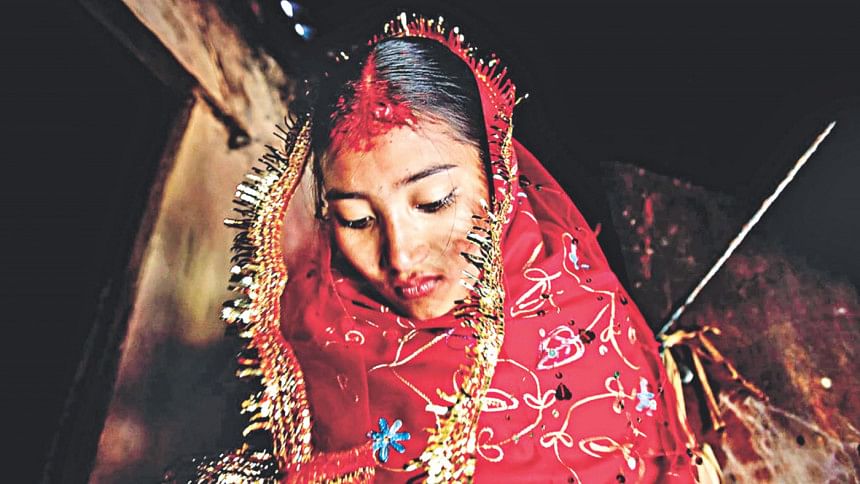Marry-your-rapist phenomena and legal realities

The Parliament of Bangladesh passed the Child Marriage Restraint Act 2017 with a special provision allowing a boy or a girl to get married before reaching the statutory age in some exceptional cases. This provision stirred the civil society of the entire country. Controversial section 19 of the Act says that notwithstanding anything contained in the Act, if a marriage takes place, in the best interest of the underage boy or girl involved, with the permission of the parents of the underage boy or girl, and with an order of the court, upon following the due procedure as laid down in the relevant Rules, that marriage shall not be considered as an offence under the Act.
One of the major criticisms against this provision was that almost anything could come within the purview of the wide domain of ‘special circumstances’. It could bring marriage of a child who happens to be a rape survivor with the rapist within its purview as well. Therefore, one of the main concerns was that this provision would turn the Act into a rape-marriage law and would exonerate the rapists from prosecution if and when he undergoes marriage with his victim. It was feared that even though the Penal Code of 1860 does not give any impression on marriage being an exonerating touchstone to absolve the rapists, the Child Marriage Restraint Act could prove to do something similar to what is done in certain North-African and Middle Eastern countries’ rape-marriage laws.
The Child Marriage Restraint Rules were enacted in 2018 and they tried to clear the air a bit. Provision 17 of the Rules speaks of the procedure that is to be followed to marry an underage boy or girl off in accordance with the Act. According to the Rules, at the very beginning an application has to be made to the court. The court shall send the application of marriage made by the parents of the children involved, or the legal guardian thereof, or by both parties to the marriage including the minor or both the minors (when both of the parties are minors) to the Assessment Committee. Assessment Committee shall consist of the following members in the best interest of the minors in every Upazilla: Upazilla Executive Officer (as the president), medical officer nominated by Upazilla Health and Family Planning Officer, Union Parishad chairman, woman of the reserved seat of relevant ward of the Paurashabha or Union Parishad, two adolescent boy and girl nominated by the Upazilla Executive Officer and an Upazilla Women Officer (as the member secretary).
Upon investigation, if the assessment committee ascertains that the marriage applied for is in the best interest of the minors and is the ultimate (sarbashesh) alternative, it shall send a report to the court with an unambiguous opinion in that regard. The proviso to this rule says that when the marriage applied for is to take place out of coercion, or when the marriage applied for is to take place in connection with rape, abduction, coerced physical relationship, or when a case of rape, abduction or coerced physical relationship is under trial in connection with the marriage applied for, the Assessment Committee shall send its report to the court enumerating its opinion against the marriage.
There are provisions that have direct bearing on child marriage in cases where the girl child in question is a survivor of rape. In light of the Rules as enacted, we now stand with laws to protect girl children from such marriages. In no circumstances can the assessment committee opine otherwise given the explicit provisions of the law. However, a confusion may remain as to the law in case of marrying a woman who has passed the statutory age limit and has survived rape. There is no law to deal with such a scenario explicitly. And more often than not, in the veil of ‘protecting the honour of the victim of rape’, ‘helping the woman deal with the stigma of rape’ or at times in an attempt of covering up the crime itself, such marriages take place.
However, what escapes our notice is the basic requirement of marriages as civil contracts (under Islamic law) – which happens to be free consent on part of both parties. In cases where a survivor of rape is married off to her rapist, the basic requirement of marriage remains unfulfilled. Consent on part of the woman is merely a perceived consent and not consent in the actual legal sense of the term. Therefore, as a civil contract, marriage between a rapist and his victim is void ab initio. Even in cases of Hindu marriages, the most accepted form of marriage is one where there is mutual consent from both the sides. In Bangladesh, where the Hindus follow traditional law, perceived consent or consent obtained upon coercion, too vitiates the marriage.

 For all latest news, follow The Daily Star's Google News channel.
For all latest news, follow The Daily Star's Google News channel. 



Comments